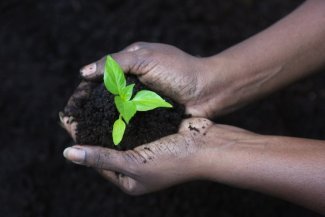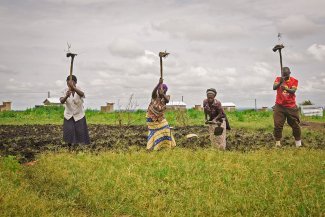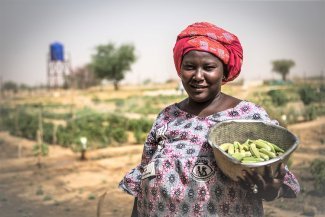
At the 8th International Conference of La Via Campesina in Bogotá, members of the movement discuss their work with other social movements and civil society actors. More than 400 members of La Vía Campesina from 185 member organisations around the world, gathered in the Colombian capital to mark the 30th anniversary of the movement.
At the end of 2023, between 1-8 December, over 400 smallholder farmers representing 200 million small-scale food producers from 182 movements in 81 countries gathered in Bogotá, Colombia for the 8th International Conference of La Vía Campesina (LVC). As well as bringing activists together – for the first time since the start of the Covid-19 pandemic – to discuss the most pressing issues for peasants globally and to create a common agenda, the event also marked the 30th anniversary of a movement which was born in Mons, Belgium in 1993.
Of the various topics explored – such as climate justice, feminism and agroecology – the struggle for land access and agrarian reform stood out as one of the most essential pillars for access to food and food sovereignty, as well as social justice in the broadest terms.
One of the starkest examples of the intersection between access to land, food sovereignty and social justice comes from Palestine, where in the latest chapter of decades of violent occupation, over 30,000 Palestinians have been killed in the bombardment of Gaza, which is taking place during a time of escalating and increasingly deadly land grabs by Israeli settlers in the West Bank. According to the most recent data from the Food and Agriculture Organization of the United Nations (FAO), about 42.6 per cent of all cropland in Gaza has been damaged. It is an issue that extends to the West Bank, where 50 per cent of vegetable farmers have been prevented from accessing their land, on at least one occasion. According to the United Nations, over half a million people are a step away from famine.
“Palestinian peasants are suffering and are prevented from having access to their land, even before 1948 and until now. Some olive trees which are more than 600 years of age are being cut to give land to the settlers,” says Hatem Aouini who is part of the Million Rural Women and the Landless of Tunisia movement. “Settlers are against the food sovereignty of Palestinians, against access to land and against the Palestinian existence. That is why Palestine is central to the struggle of La Vía Campesina all over the world.”
Amidst a global food crisis of unprecedented proportions driven by conflict, economic shocks, climate extremes and the soaring cost of fertilisers, LVC continues to defend food sovereignty as a means to resolve this emergency.
“Capitalism is the main source of the current problems. We have a broken global food system that produces so much food that if you redistribute it all, there will be more than enough food to feed the eight billion people in the world. Yet this system coexists with [almost] one billion chronically hungry people,” Jun Borras, professor of Agrarian Studies at the International Institute of Social Studies at Erasmus University in the Netherlands and one of the founders of LVC, tells Equal Times.
For three decades LVC has been working to empowering peasants worldwide with one main objective: acquiring food sovereignty, a concept defined by the organisation as “the right of peoples to healthy and culturally appropriate food produced through ecologically sound and sustainable methods and their right to define their food and agriculture systems.”
Although different factors are needed to acquire food sovereignty, LVC believes that securing more equal access to land is essential to guaranteeing people’s right to healthy and sustainable food products. “It is unthinkable to talk about food sovereignty without democratic land access. How can you push for agroecology without democratising that same agroecological system in terms of land and nature? It is impossible,” adds Borras.
According to a study carried out in 2020 by the International Land Coalition, the wealthiest 10 per cent of rural populations across 17 sample countries capture 60 per cent of agricultural land value, while the poorest 50 per cent of rural populations, who are generally more dependent on agriculture, capture only 3 per cent of land value. The study concluded that land inequality is higher than previously reported and threatens the livelihoods of an estimated 2.5 billion people worldwide involved in smallholder agriculture.
The struggle for land to acquire food sovereignty
The case of Palestine is not an isolated example of how violence is used to take the land of a group of people. According to Borras, the current atrocities being committed against Rohingya Muslims in Myanmar [editor’s note: which began in 2016-2017] hold similarities. “The military government in Myanmar that forcibly took over in a coup in 2021, was burning [many] villages. This is a form of land grabbing, not to produce something, but the opposite. To make sure that nothing can be produced to starve resistance groups.” Other factors contributing to land inequality are gender, social and political inequalities as well as market forces.
Agroindustry and mining are both examples of market-driven forces that promote land accumulation and lead to water and land degradation. This situation affects peasants, fishermen, and women worldwide, limiting their access to land and the possibility of sustaining themselves from agriculture. According to artisanal fisherwoman Josana Pinto, who is a part of the Movement of Fishermen and Women of Brazil (MPP), the contamination of water by the mining sector, the limitation of land access by large-scale industries and the destruction of mangroves by prawn farms are some of the biggest challenges faced by artisanal fishermen and women in Brazil. “For us, if we don’t have access to our territories, we don’t have production, history, or life,” she says.
“In the Brazilian Congress, the Rural Bench [a powerful faction within the National Congress allied with the interests of agribusiness] is always benefiting the agroindustry but our movement is a popular one. We are aligned with other movements of La Vía Campesina and our Indigenous brothers and sisters. We believe that only the union can make a difference and guarantee our rights to land and water,” Pinto adds.
Worldwide, peasant and fisher movements are organising themselves to defend their land rights and acquire food sovereignty. From direct actions, such as land occupation, to legal actions such as law projects or creating peasant reserves.
Some of these struggles are also associated with other kinds of inequities, as is the case of Sri Lanka, where gender is directly linked to unequal land rights. In 2020, women were guaranteed inheritance land rights through the Land Development Ordinance (LDO) Amendment Act. “There were many cases where women had to leave their land because the elder brother came and said: ‘This land doesn’t belong to you. You have to leave.’ In these cases, there were even many acts of physical and psychological violence,” says Anuka De Silva, a member of the Women for Land and Agricultural Reform in Sri Lanka and part of the International Coordination Committee of LVC.
In Tunisia, after the revolution of 2011, a wave of occupations arose from the south of the country close to the city of Kebili. To Aouini, the case of land occupation by the Association for the Protection of the Jemna Oasis is an example to follow. This date farm, which was first exploited by French settlers and then by the Tunisian state, is now run by the community. Five years after the occupation, the community has managed to double production in the 185-hectare date farm, creating great benefits for local residents. “Now, the profits are shared in the form of a cooperative. First, among the small peasants, and secondly to improve the living conditions of the community. They bought an ambulance, built a school and a football pitch for children,” says Aouini.
In Tunisia, the wave of occupations was repressed with legal persecution by the state and led to the failure of many occupied farms. “Unfortunately, after we occupied the land, many of our comrades were arrested, put in prison, and until now – after more than 10 years – they are still suffering from issues with courts,” says Aouini. Despite these setbacks, peasant movements in Tunisia continue to mobilise to acquire food sovereignty, inspired by the successful story of the Jemna date farm and that of the Landless Workers Movement (MST) in Brazil – where through occupation 370,000 families have settled on 7.5 million hectares of land, resulting in access to schooling, agricultural credits and healthcare.
“We believe that occupation is a revolutionary tactic that can help small peasants to have access to land. However, cooperatives, communal companies, the solidarity economy and other alternatives can also be a solution for young people, women and small peasants to access land,” says Aouini.
In Brazil, fishers presented a bill in 2020 to recognise and guarantee the right to the territory of traditional fishing communities, which is understood as material and immaterial cultural heritage. “Currently, we have a law project of popular initiative presented to the Congress. We aim through this project to regularise our territories to guarantee food sovereignty and better living conditions for all of us,” says Pinto.
Colombia is also advancing in the protection of land rights for peasant communities through the creation of Peasant Reserve Zones (ZRCs). So far, there are 12 ZRCs in the country comprising around 403,000 hectares – five of which were constituted during the current left-wing government of Gustavo Petro. The creation of these zones aims to prioritise traditional agricultural practices over monoculture plantations, limit land grabbing by agroindustry, and serve as a buffer zone to limit the impact of development on protected areas.
To Borras the struggle for food sovereignty is a process and there is still a long way to go. “Many of the struggles for democratising land access are far too scattered and far too few,” admits Borras. “As we speak there are around 100 million forcibly displaced people in the world. They need land to reconstruct their lives and restore their communities, but there is not one restitution policy that is working in the world.”
Despite the challenges, to Borras the glass is still half full rather than half empty. “We know there is no future for this capitalist food system. It has to die but it is not yet dead. In this process, food sovereignty activists act as collective midwives that are giving birth to a new system.”












